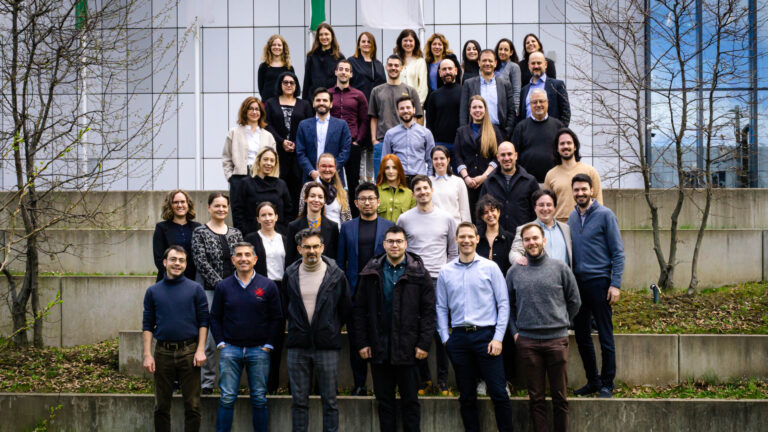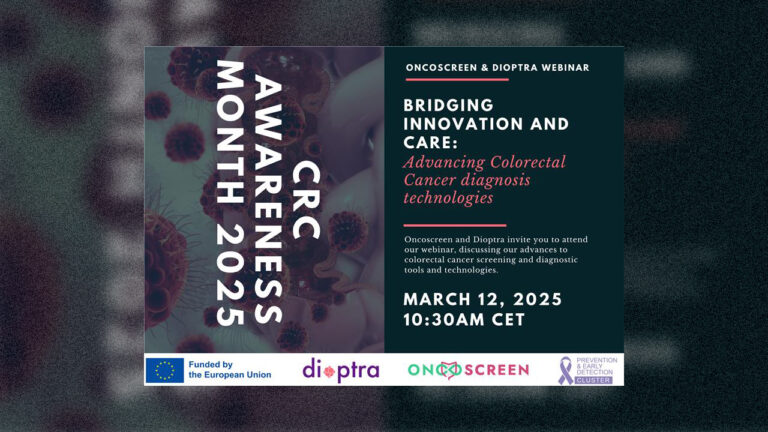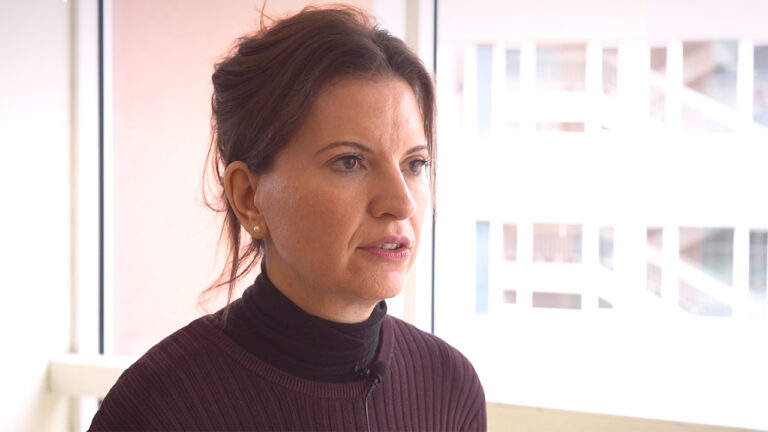Colorectal cancer (CRC) is a significant global health concern, with more than 500,000 European citizens diagnosed every year. As we observe Colorectal Cancer Awareness Month this March, it’s crucial to shine a spotlight on the importance of early detection and prevention strategies in combating this disease.
At DIOPTRA, our mission is to revolutionize CRC screening by offering a non-invasive, accessible, and personalized risk estimation through liquid biopsies. The aim is to identify high-risk cases that require colonoscopy, increase participation rates, and improve early detection.
For this Colorectal Cancer Awareness Month, we explore the significance of this disease, the importance of early detection, discuss screening recommendations and highlight available resources to raise awareness across Europe and the world.
Understanding Colorectal Cancer
Colorectal cancer, also known as bowel cancer or colon cancer, develops in the colon or rectum and typically begins as benign polyps. Over time, these polyps can become cancerous, leading to the development of CRC. While the exact cause of CRC is unknown, several risk factors, including age, family history, lifestyle factors, and certain genetic conditions, can increase an individual’s likelihood of developing the disease.
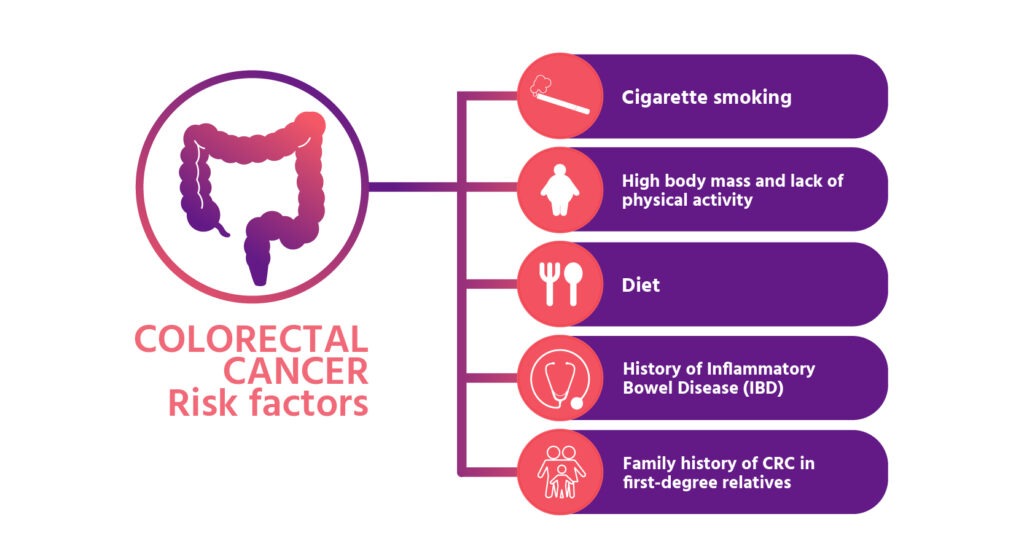
Importance of Early Detection
Early detection is key to improving outcomes and increasing survival rates for individuals diagnosed with colorectal cancer. When detected in its early stages, CRC is often highly treatable, with a range of effective treatment options available. However, late-stage diagnosis can significantly impact prognosis and reduce treatment options. Therefore, raising awareness about the importance of early detection and encouraging regular screening is crucial in the fight against CRC.
How DIOPTRA aims to Revlolutionise the detection of CRC
One of the challenges of early CRC detection is the invasive and somewhat uncomfortable process of a colonoscopy. While the first line of CRC detection, a significant portion of the population delay or avoid getting a colonoscopy for various reasons, including discomfort, fear, misconceptions, costs and procrastination. According a Harvard Health study, only about 38% of patients will willingly undergo a colonoscopy, compared to about 57% who are offered a stool-based test.
DIOPTRA seeks to revolutionize (CRC) screening by offering a non-invasive, accessible, and personalized risk estimation through liquid biopsies. The aim is to identify high-risk cases that require colonoscopy, increase participation rates, and improve early detection.
DIOPTRA aims to introduce a front-line screening tool that will consider risk factors and protein biomarkers for pinpointing individuals at high risk for CRC incidence. By examining tissue and blood samples, we can distinguish a discriminative set of prognostic proteins that are detectable via standard bloodwork and can indicate a need for further evaluation – for example, a colonoscopy as a second stage diagnosis. Medical, behavioural and additional data are also considered as potential risk factors. We are also leveraging Artificial intelligence (AI) for assessing prognostic power, while personalised behavioural change are promoted based on modifiable risk factors. Given the low citizen participation in CRC screening across the European Union, DIOPTRA seeks to broaden the evaluated population, boosting participation rates and bypassing age screening thresholds.
Read more: Groundbreaking study aims to improve detection of colorectal cancer using AI technology
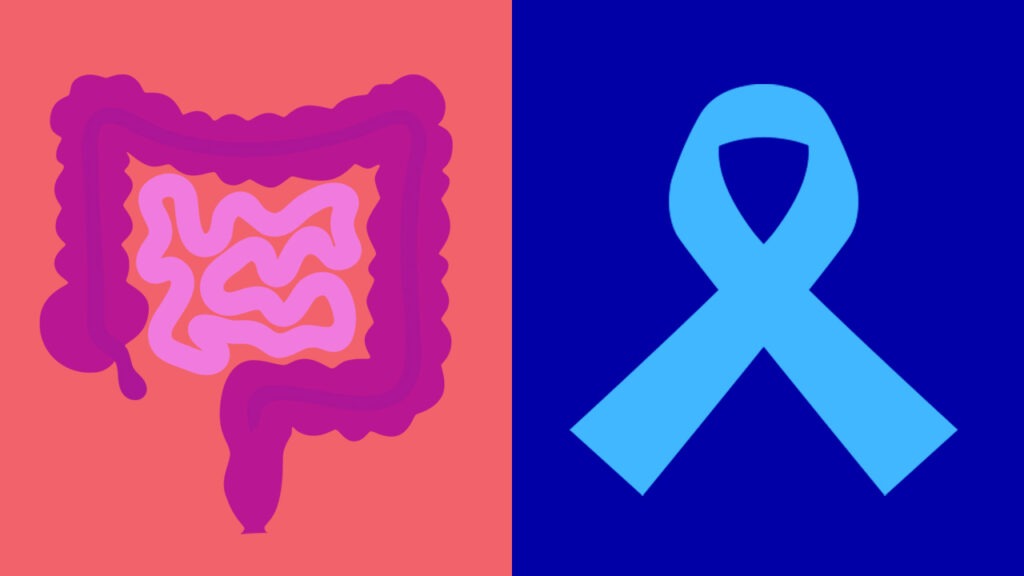
Current Screening Recommendations
According to the Association of European Cancer Leagues, current EU guidelines for colorectal cancer screening includes:
- Men and women starting at age 50–60 years, and from then on,
- Every 2 years if the screening test is the guaiac-based faecal occult blood test (gFOBT) or the fecal immunochemical test (FIT), or
- Every 10 years or more if the screening test is flexible sigmoidoscopy (FS) or colonoscopy (TC).
Screening tests can help identify precancerous polyps or early-stage CRC before symptoms develop, allowing for timely intervention and improved outcomes. It’s essential to consult with a healthcare professional to determine the most appropriate screening option based on individual risk factors and preferences.
Available Resources
In addition to regular screenings, various resources are available to support individuals in their journey towards colorectal cancer prevention and early detection. Organizations such as the World Health Organization, World Cancer Research Fund, Colorectal Cancer Alliance, and Digestive Cancers Europe offer a wealth of information, educational materials, and support services for patients, caregivers, and healthcare professionals. These resources include online tools, educational videos, support groups, and helplines, providing individuals with the guidance and support they need to navigate their colorectal health journey effectively.
Take Action Today
As we commemorate Colorectal Cancer Awareness Month, let’s commit to raising awareness, promoting early detection, and developing new technologies to help eradicate this disease. Whether it’s scheduling a screening, sharing information with loved ones, or participating in awareness campaigns, every action counts in the fight against colorectal cancer. Together, we can make a difference and save lives.

